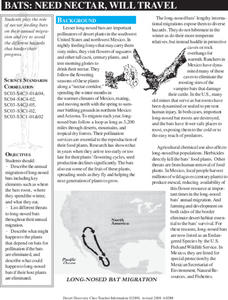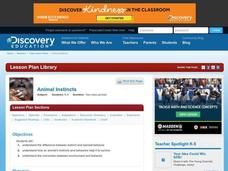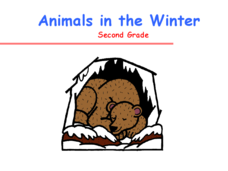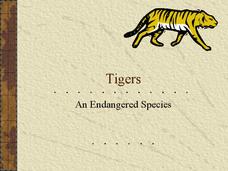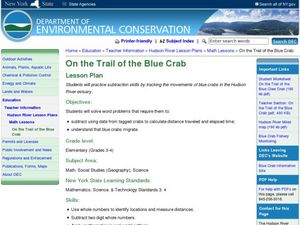Curated OER
In the Company of Whales
Students examine whales and how they migrate. In this whale lesson students research whales and their migration patterns.
Curated OER
Bats: Need Nectar, Will Travel
Beginning wildlife biologists become adult bats, baby bats, snakes, owls, bobcats, or land-clearing developers in a grand role-playing activity. In a large open space, they play a game in which they move to designated areas based on what...
Curated OER
Get Ready, Get Set, Hibernate
Students match each body part or idea from a work bank about methods of animal adaptations for winter survival. They observe as the first one, food is covered with the whole class before completing the rest of the diagram. They discuss...
Curated OER
Blue Planet: Frozen Seas
Students study the animals from the Arctic and how they have adapted. In this ocean lesson students create a poster about their given animal and present it to the class.
Curated OER
Birds on the Move
Students observe the migrational path of the Swainson's Hawk from northern Minnesota to the southern portion of South America. They study the migratory path of the hawk and observe how the vegetation in a particular region of the earth...
Curated OER
Awesome Adaptations!
Second graders explore biology by researching animal characteristics. For this adaptation lesson, 2nd graders identify the history of several animals and research the changes that have occurred to their anatomy over thousands of years....
Curated OER
Ocean Exploration
Students explore whales. In this animal adaptation and whale instructional activity, students access prior knowledge about whales from previous lessons, then use background knowledge to predict the eating strategies of a baleen whale and...
Curated OER
Animal Instincts
Students compare animal adaptations to human behavior. In this science lesson, students discuss animal instincts vs. learned behavior. Options for student writing, drawing and research are incorporated into this lesson plan
Cornell Lab of Ornithology
Amazing Birds
What's so amazing about birds? Find out just how amazing birds are with a physics of animal behavior unit created by Cornell Lab of Ornithology. Have learners explore and tap into their observational skills and notice how birds fly, what...
Curated OER
Migration
Students study reasons for and examples of bird migration as a behavioral adaptation. They investigate the Bernoulli's Principles.
Curated OER
My Favorite Animal and Me
Students research their favorite animal. They create their own fact book to share about their animal and their habitat.
Curated OER
Population Game
Young scholars assess the carrying capacity of the land. For this animal population lesson, students participate in a role-playing scenario to discover the factors affecting animal populations.
Curated OER
Hawaii's Migratory Animals
Students act as travel agents to plan a trip for a migratory animal. They conduct research and design a travel brochure that includes a migratory route, illustrations of planned stopovers and special tourist attractions the animal might...
Curated OER
Animal Brochures
Fourth graders work in pairs to research an animal. They fill in an animal data form in order to become experts about the animal they choose. They use the listed criteria to design a six sided brochure that includes graphics of the...
Curated OER
Get Ready to Hibernate! Migrate! or Get Fat!
Young scholars explore the different ways which animals survive the winter months, and sort animals into correct categories using a Venn diagram.
Curated OER
Do the Locomotion with Me
Fourth graders listen to a reading of In the Snow Who's Been Here? They experiment with making tracks by painting the bottom of their shoes and making tracks using different forms of locomotion. They apply what they know to winter...
Curated OER
Animals in the Winter: Second Grade
Ever wonder what animals do in winter? If your 2nd graders do then they will enjoy this PowerPoint. Each slide begins with a questions and then provides the answer, it is a short presentation but the resource links at the bottom make it...
California Academy of Science
Coincidental Colonization
The Galápagos Islands are an amazing place of isolated adaptation, colonized by an interesting mix of plants and animals. The class plays a game to help them understand how these organisms came to live on the island through a combination...
Curated OER
The Origin of Humans
Where did human beings come from? How did they settle into communities and civilizations? Your class will find the answers in this fascinating presentation, which takes the viewer through the stages of mankind, from the primitive...
Curated OER
Tigers: An Endangered Species
Facts about tigers are packed into a PowerPoint presentation about tigers. The presentation includes great photographs and accompanying text regarding the habitats, diet, lifespan, and physical attributes of tigers. Very interesting!
Curated OER
On the Trail of the Blue Crab
Third graders read the article "Blue Claw," discuss crab migration, and look at a map of the Hudson River. They complete a worksheet where they must use subtraction to determine the distance migrating crabs travel.Web links, article, and...
Curated OER
On the Road Again
Students trace the migration route of a gray whale. They color and label a map of North America, and using photocopy pictures of a gray whale, they move the whale along the migration route over a ten week period.
Curated OER
Do As I Do
Lead your class in practicing gross motor body movements. Put on some background music and lead them through hops, skips, jumps, leaps, and running in place. Think of animal movements and have them move like an elephant or slither like a...
Curated OER
Why Do Geese Fly South For the Winter?
Fifth graders examine migration by tracing animal migration routes on a map. In this animal life lesson, 5th graders observe a map of North America and read about the migration patterns of geese. Students trace the path most geese take...



